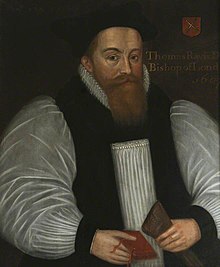Thomas Ravis
|
The Right Reverend Thomas Ravis |
|
|---|---|
| Bishop of London | |
 |
|
| Church | Church of England |
| Diocese | Diocese of London |
| Elected | 18 May 1607 |
| Installed | 2 June 1607 |
| Term ended | 1609 (death) |
| Predecessor | Richard Vaughan |
| Successor | George Abbot |
| Other posts |
Bishop of Gloucester 1604–1607 Dean of Christ Church, Oxford 1596–1607 |
| Orders | |
| Ordination | 1582 |
| Consecration | 17 March 1605 |
| Personal details | |
| Born |
c. 1560 Old Malden, Surrey |
| Died | 14 December 1609 |
| Buried | St Paul's Cathedral, London |
| Nationality | English |
| Denomination | Anglican |
| Profession | Academic |
| Education | Westminster School |
| Alma mater | Christ Church, Oxford |
Thomas Ravis (c. 1560 – 14 December 1609) was a Church of England clergyman and academic.
He was born at Old Malden in Surrey, probably in 1560, and was educated at Westminster School. he was elected, on the recommendation of Lord Burghley, to Christ Church, Oxford, in 1575; the dean and chapter declined to admit him on the ground that there was no room, until Burghley remonstrated with them. He graduated B.A. on 12 November 1578, and M.A. on 3 March 1582, proceeding B.D. in 1589 and D.D. in 1595.
He took holy orders in 1582, and preached around Oxford for some time. On 17 April 1588 he was elected one of the proctors, and in July 1596 and again in July 1597 was chosen Vice-Chancellor of the University of Oxford . In 1591 he was admitted to the rectory of Merstham, Surrey, and from 27 December of the same year until May 1598 was vicar of Allhallows Barking. From February 1593 till 1607 he was prebendary of Westminster, and from 1596 until 1605 an authoritarian Dean of Christ Church. As Dean he commuted the commons allowance for food into monetary form, of two shillings a week. Some of those who resisted this innovation he expelled; others he sent before the council, and others he imprisoned.
On 7 July 1598 he became vicar of Islip, and in the following October vicar of Wittenham Abbas, Berkshire. He was one of the six deans who attended the Hampton Court Conference in 1604, and later supplied notes for William Barlow's account, the Sum and Substance of the Conference. He was then involved in the subsequent creation of the King James Bible, being appointed one of the Oxford committee deputed to translate part of the New Testament. Also in that year he was elected prolocutor of the lower house of convocation.
...
Wikipedia
